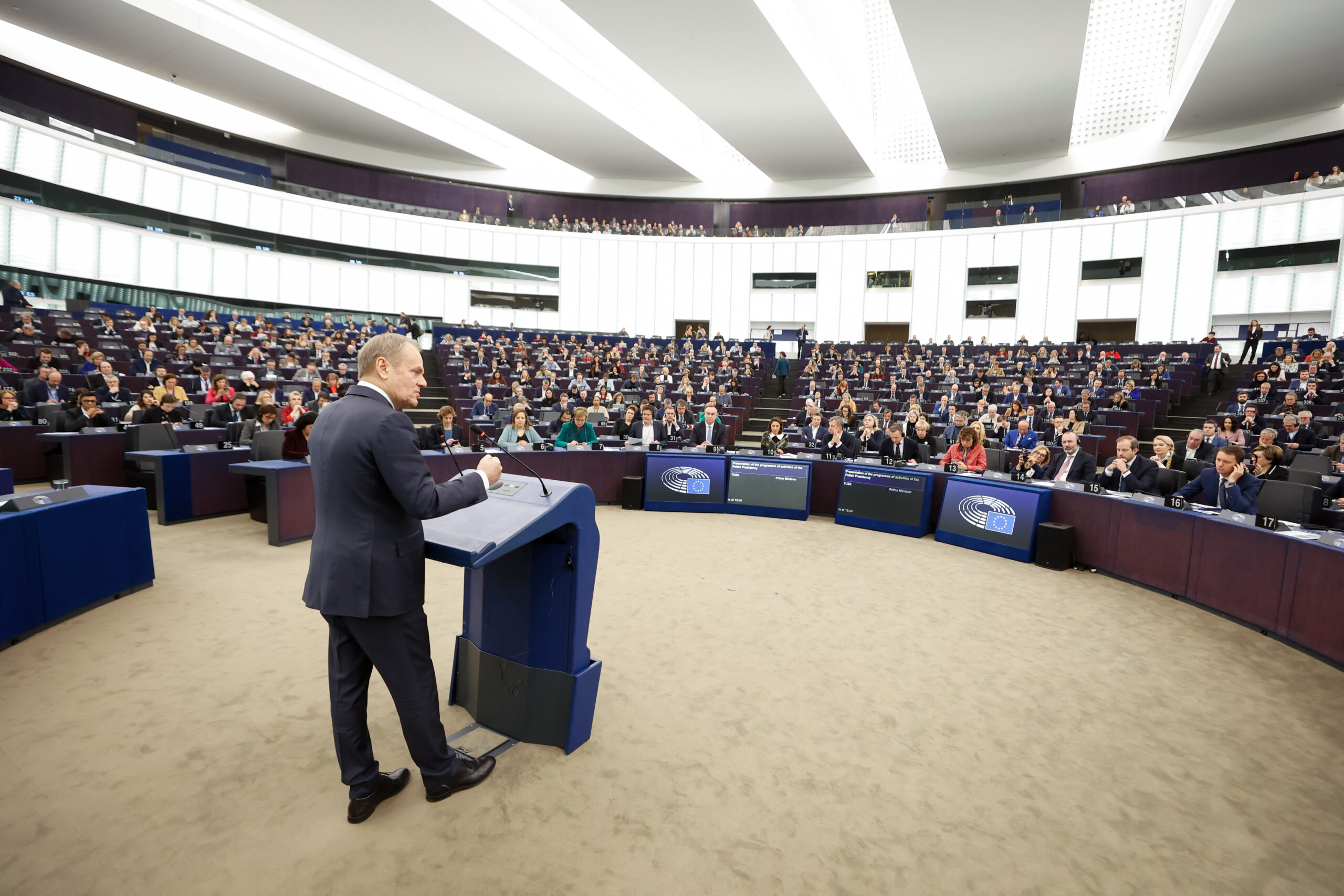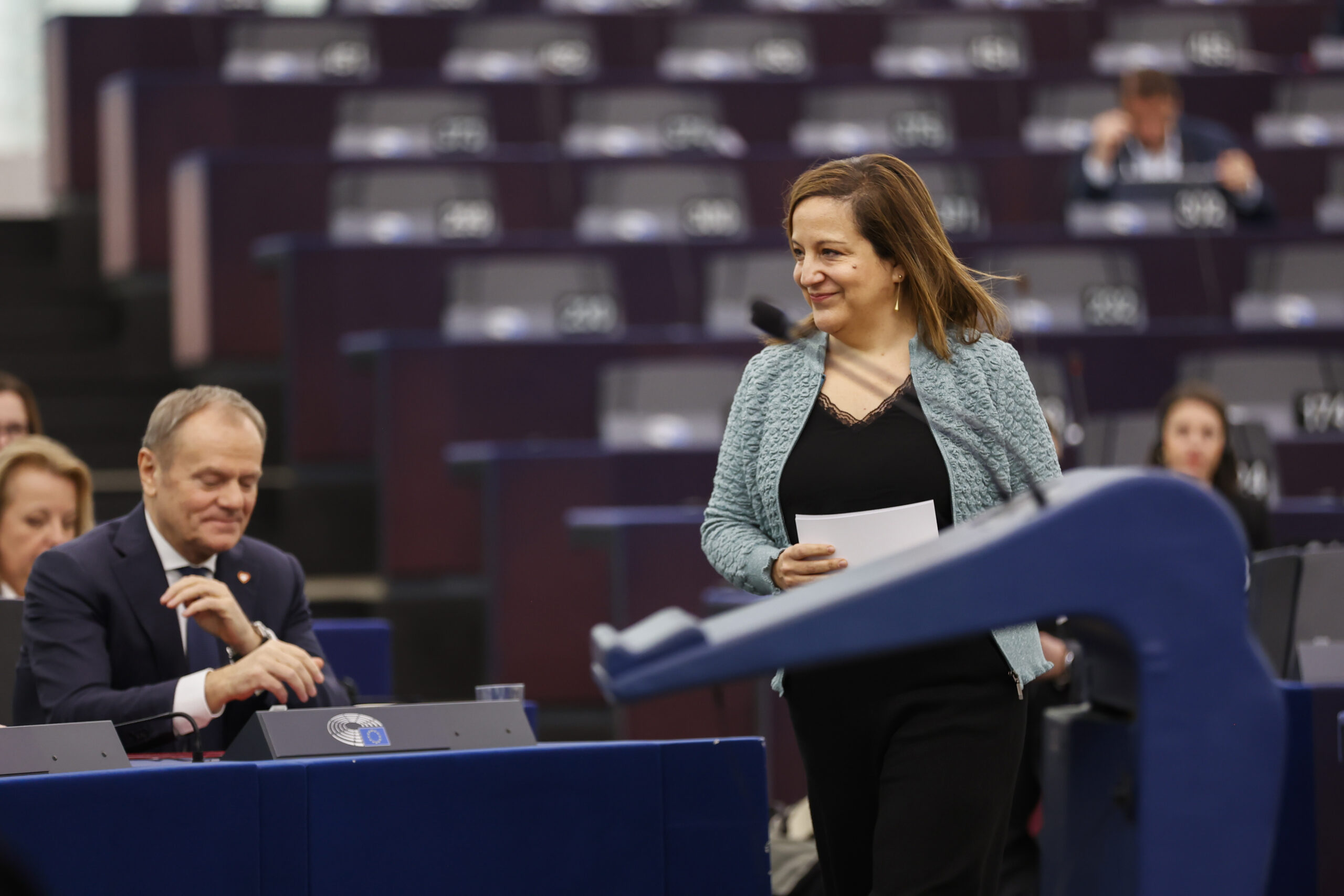From the correspondent in Strasbourg – Almost a call to arms, the speech with which Polish Prime Minister, Donald Tusk, presented to the European Parliament the priorities of Poland’s six-month presidency at the EU Council. Warsaw’s chosen motto, “Security, Europe!” is a whole program, the “highest priority,” declined even in seven dimensions. The first, the prerogative of all others, is security against external enemies: “If Europe wants to survive, it must arm itself,” said Tusk—as his Poland already does, spending five per cent of its GDP on defence.
The Polish premier’s appeal is only the latest on the day when the EU High Representative for Foreign Affairs, Kaja Kallas, and the EU Commissioner for Defense, Andrius Kubilius, also underlined the urgency of “mobilising finances to meet our defence needs.” Kubilius, speaking at the European Defense Agency annual conference, raised the bar for military spending relative to GDP to 5–6 per cent. Also this morning, the president of the European Council, António Costa, insisted on the need to build a true “Defense Union.”

Tusk chose a less concrete speech, relying entirely on the symbolic power of the images recalled. From revisiting the Polish anthem in a European key, which states that “Poland will not die as long as we live,” to the “crisis of the European spirit.” The Polish premier cited Christopher Columbus, Alexander the Great, the Vikings, and European navigators because Europe “should always refer to the great moments in our history that changed the world.”
This “greatness” gives Europe “the right to speak with conviction in a loud voice” before other global players in an increasingly aggressive and uncertain geopolitical context. “We are equal to other powers; that’s a fact, but we have to believe it!” an infuriated Tusk told MEPs. No inferiority complex, starting with the relationship with the overseas ally. “If today Trump talks about the need to take more responsibility for our own security, let’s see it as a positive challenge,” Tusk continued, pointing out that on closer inspection, “only an ally can wish its ally to be stronger.” The popular premier then revisited a famous maxim of John Fitzgerald Kennedy, urging MEPs to “ask not what America can do for Europe, but what you can do for Europe and your security.”
The 7 Dimensions of Security and the Green Deal Review
Warsaw represented the security diktat in seven dimensions: in addition to external, those of internal, information, economic, energy, food, and health security. Tusk claimed the commitment of Poland, a country that “now allocates 5 per cent of its GDP to security and does so for all of Europe,” because it shares more than 600 kilometres of border with Russia and Belarus. Tusk clarified, “It is not my choice; I am not a militarist. But to avoid a tragic history repeat, we must be strong, armed, and determined.”
Tusk then denounced the instrumentalization of migration and hybrid attacks, calling on the EU Parliament to “propose to Europe a grand deregulation project,” hoping—in line with his political family, the EPP—to take steps backwards on the Green Deal framework. “I ask you to have a critical and objective review of all regulations, including the Green Deal. We must be able not only to point out the new way but also to change this legislation that can lead to a further hike in energy prices,” said the premier, who said that ultimately, “European independence and sovereignty are linked to energy independence,” and if Europe fails economically, “no one will care about the environment globally anymore.”
Parliament reactions and clash with Polish conservatives

The EU Parliament reacted with equal fervour to the impassioned speech by the president-in-office of the EU Council. Hailed by the populars, greeted with relief by socialists and liberals after Viktor Orbán’s six-month presidency, attacked harshly by both the radical left and far-right groups. For the leader of the EPP, Manfred Weber, Tusk has “restored the rule of law in Poland and put Poland back at the centre of Europe” and has had the merit—while others “naively treated Russia as a strategic partner“—of “calling for an Energy Union to get us away from Putin.” The Social Democrats (S&D) group leader, Iratxe Garcia Perez, slammed the backward steps on green transition because “Green Deal is security” and the call for deregulation, which means “taking steps backwards.” But she then extended her hand toward the popular premier, reinterpreting the words of the Polish anthem with which Tusk had opened: “Not even the EU will die as long as democratic forces work together and stay alive,” said the socialist leader.
Explicit accusations against Tusk, as well as from Patriots (PfE) and Sovereignists (ESN), have also come from the European Conservatives and Reformists (ECR), whose president, Mateusz Morawiecki, is the leader of the Law and Justice (PiS) party and former Polish premier. “We have a prime minister who lies, who uses a lot of nice words but does the opposite of what he preaches,” PiS MEP Patryk Jaki attacked him before listing a series of the premier’s alleged faults: the recent purchase of Russian gas, the construction of 49 migrant centres, and the manipulation of the concept of the rule of law.
Tusk addressed his final lunge to the delegation of PiS, Fratelli d’Italia’s ally in Europe. “I felt ashamed listening to them,” he said in concluding the debate, “they are not used to good manners.” Tusk claimed his struggle “with other democratic forces in Poland precisely to remove these people from power because their modus operandi is a threat to the Union and its values.” Amid applause from pro-European coalition groups, Tusk accused Germany’s AfD and Poland’s PiS of supporting each other “aided by Moscow”.
English version by the Translation Service of Withub







